人教新目标(Go for it)版九年级全册 Unit 10 You're supposed to shake hands.过关训练习题课件(共53张PPT)
文档属性
| 名称 | 人教新目标(Go for it)版九年级全册 Unit 10 You're supposed to shake hands.过关训练习题课件(共53张PPT) |  | |
| 格式 | pptx | ||
| 文件大小 | 497.0KB | ||
| 资源类型 | 教案 | ||
| 版本资源 | 人教新目标(Go for it)版 | ||
| 科目 | 英语 | ||
| 更新时间 | 2022-10-01 15:11:03 | ||
图片预览

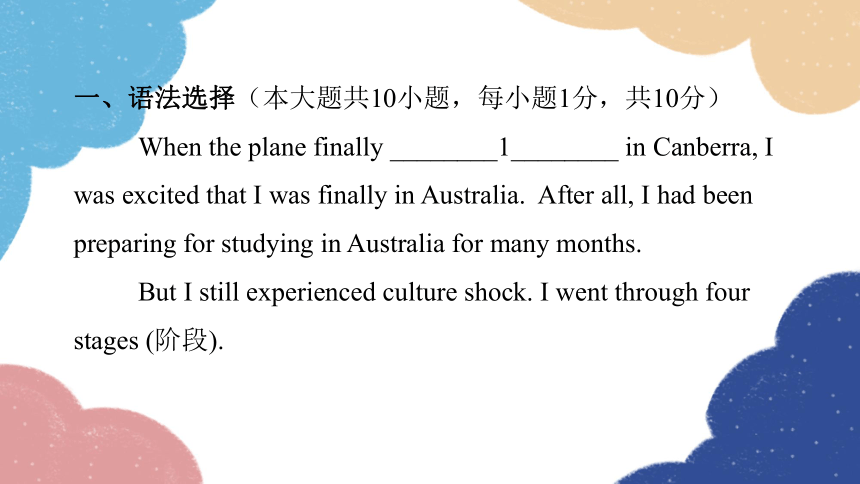
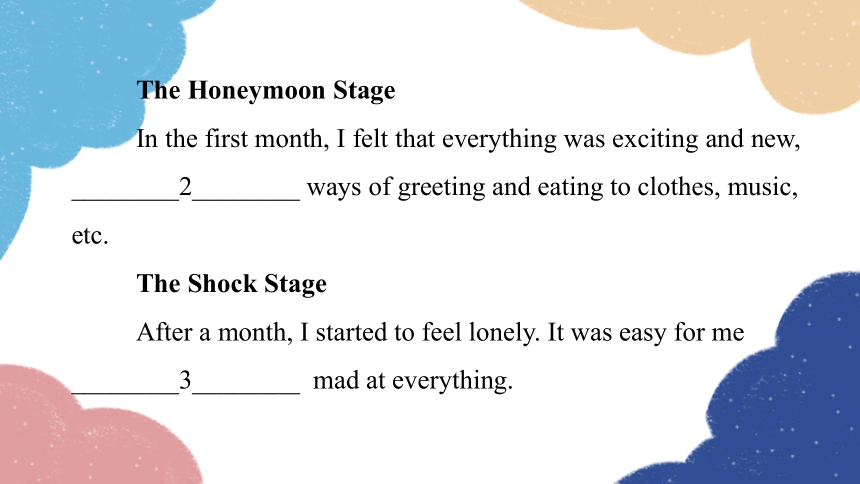
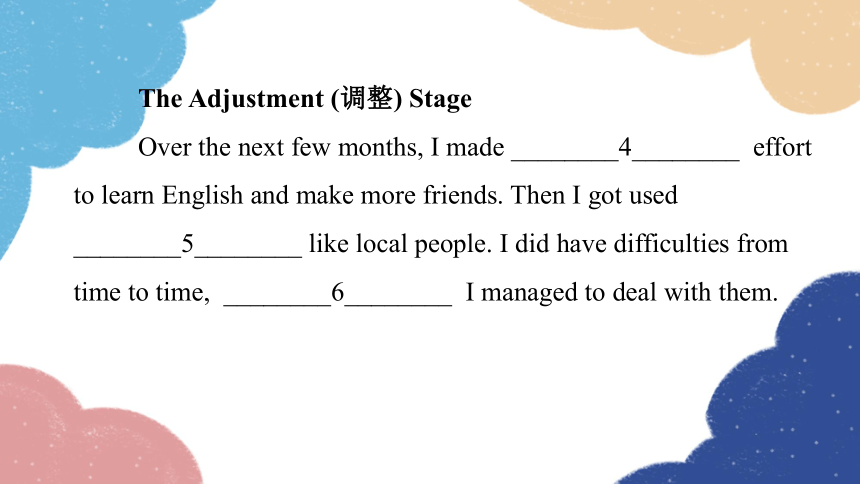
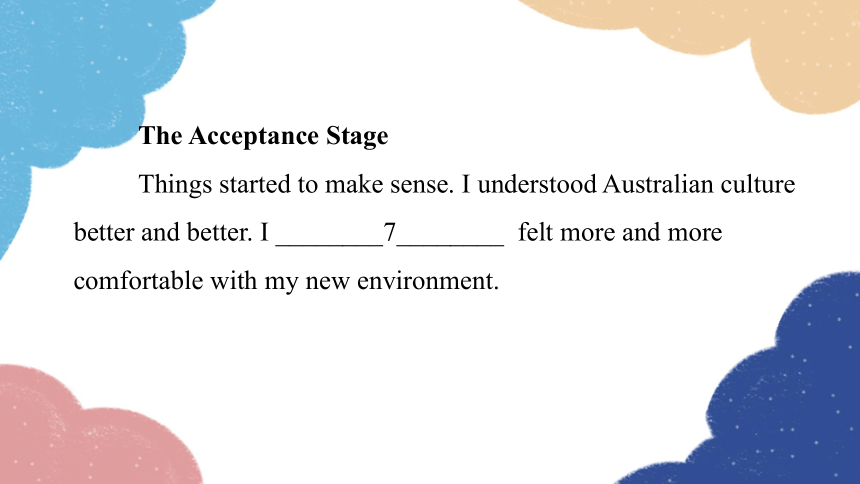
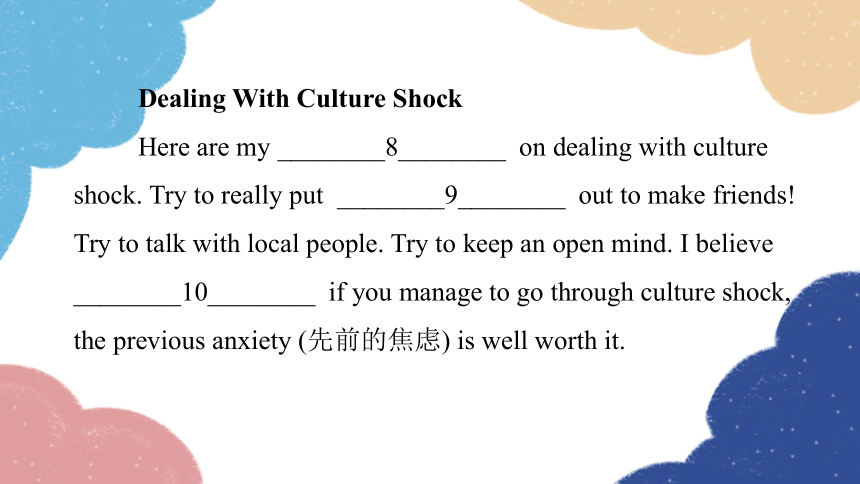
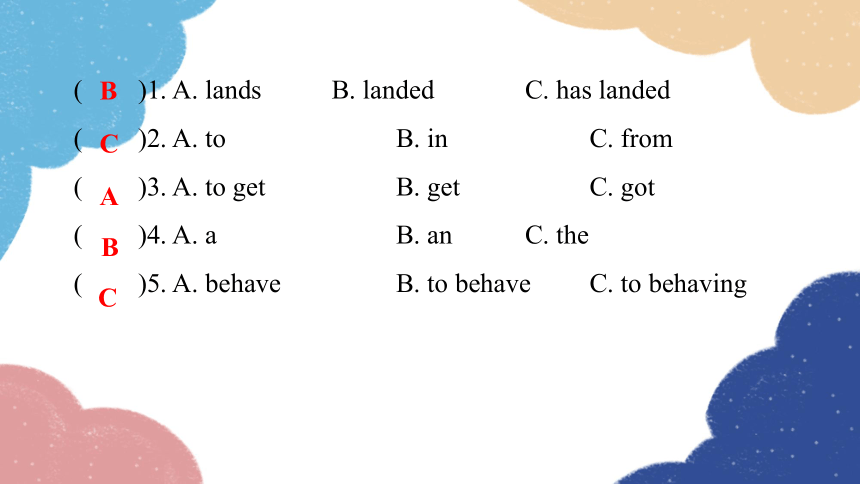
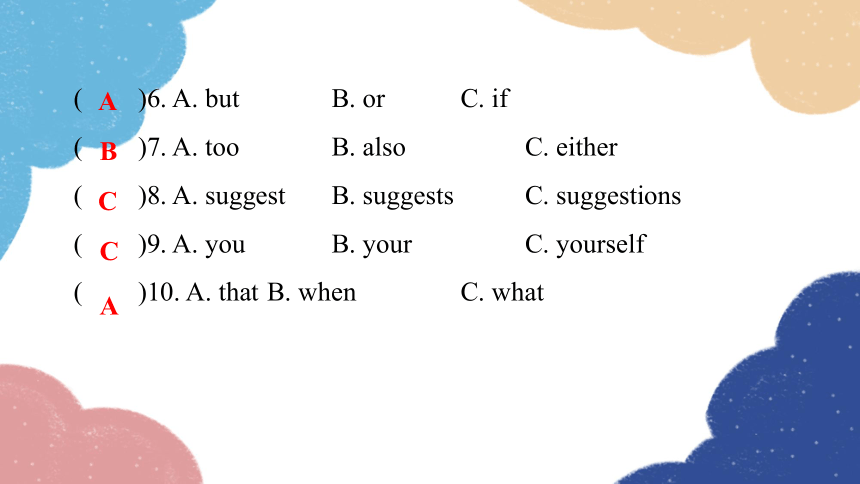
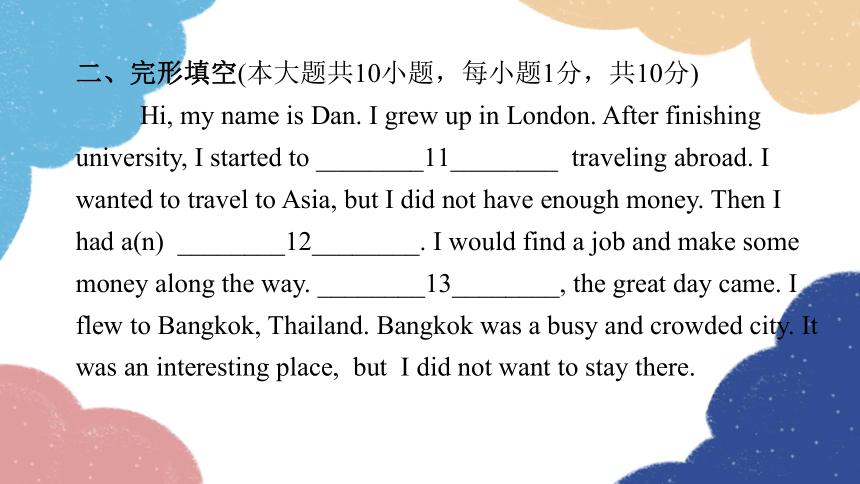
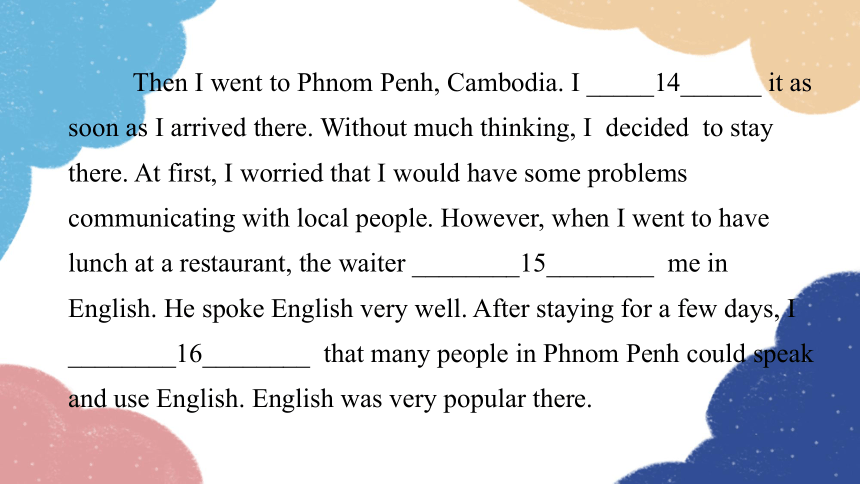
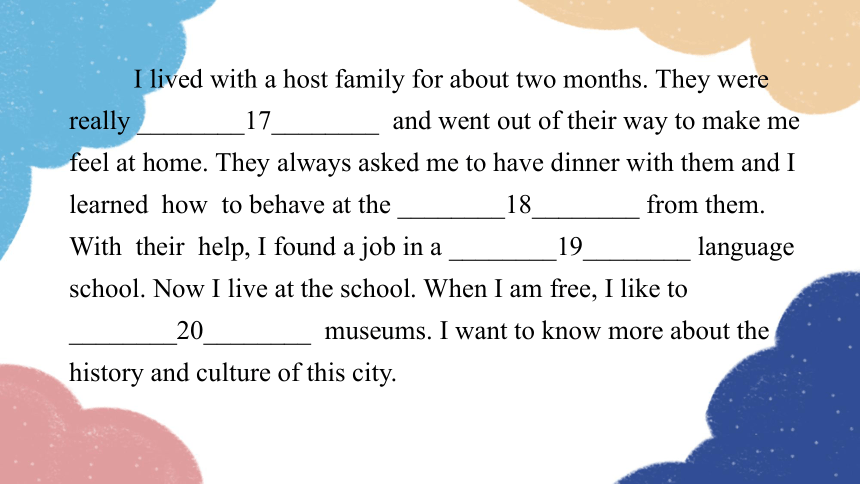
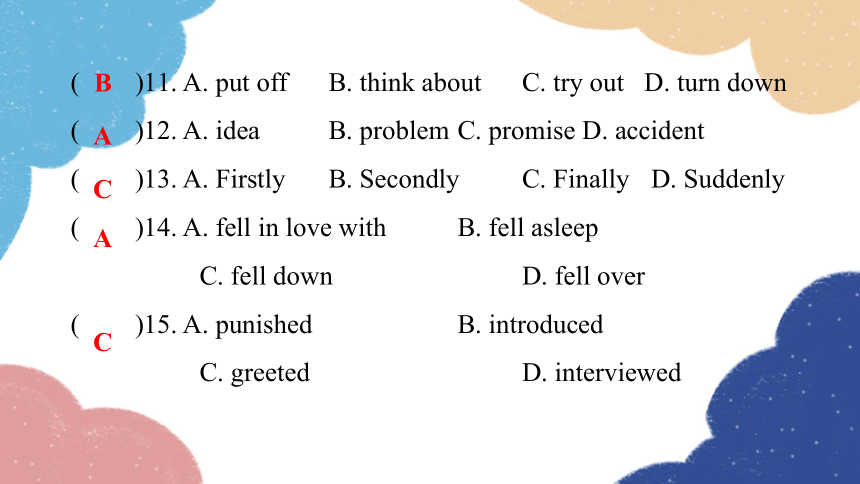
文档简介
(共53张PPT)
Unit 10 过关训练
一、语法选择(本大题共10小题,每小题1分,共10分) When the plane finally ________1________ in Canberra, I was excited that I was finally in Australia. After all, I had been preparing for studying in Australia for many months.
But I still experienced culture shock. I went through four stages (阶段).
The Honeymoon Stage
In the first month, I felt that everything was exciting and new, ________2________ ways of greeting and eating to clothes, music, etc.
The Shock Stage
After a month, I started to feel lonely. It was easy for me ________3________ mad at everything.
The Adjustment (调整) Stage
Over the next few months, I made ________4________ effort to learn English and make more friends. Then I got used ________5________ like local people. I did have difficulties from time to time, ________6________ I managed to deal with them.
The Acceptance Stage
Things started to make sense. I understood Australian culture better and better. I ________7________ felt more and more comfortable with my new environment.
Dealing With Culture Shock
Here are my ________8________ on dealing with culture shock. Try to really put ________9________ out to make friends! Try to talk with local people. Try to keep an open mind. I believe ________10________ if you manage to go through culture shock, the previous anxiety (先前的焦虑) is well worth it.
( )1. A. lands B. landed C. has landed
( )2. A. to B. in C. from
( )3. A. to get B. get C. got
( )4. A. a B. an C. the
( )5. A. behave B. to behave C. to behaving
B
C
A
B
C
( )6. A. but B. or C. if
( )7. A. too B. also C. either
( )8. A. suggest B. suggests C. suggestions
( )9. A. you B. your C. yourself
( )10. A. that B. when C. what
A
B
C
C
A
二、完形填空(本大题共10小题,每小题1分,共10分)
Hi, my name is Dan. I grew up in London. After finishing university, I started to ________11________ traveling abroad. I wanted to travel to Asia, but I did not have enough money. Then I had a(n) ________12________. I would find a job and make some money along the way. ________13________, the great day came. I flew to Bangkok, Thailand. Bangkok was a busy and crowded city. It was an interesting place, but I did not want to stay there.
Then I went to Phnom Penh, Cambodia. I _____14______ it as soon as I arrived there. Without much thinking, I decided to stay there. At first, I worried that I would have some problems communicating with local people. However, when I went to have lunch at a restaurant, the waiter ________15________ me in English. He spoke English very well. After staying for a few days, I ________16________ that many people in Phnom Penh could speak and use English. English was very popular there.
I lived with a host family for about two months. They were really ________17________ and went out of their way to make me feel at home. They always asked me to have dinner with them and I learned how to behave at the ________18________ from them. With their help, I found a job in a ________19________ language school. Now I live at the school. When I am free, I like to ________20________ museums. I want to know more about the history and culture of this city.
( )11. A. put off B. think about C. try out D. turn down
( )12. A. idea B. problem C. promise D. accident
( )13. A. Firstly B. Secondly C. Finally D. Suddenly
( )14. A. fell in love with B. fell asleep
C. fell down D. fell over
( )15. A. punished B. introduced
C. greeted D. interviewed
B
A
C
A
C
( )16. A. explained B. suggested
C. mentioned D. discovered
( )17. A. serious B. friendly C. strict D. proud
( )18. A. door B. room C. table D. bed
( )19. A. thick B. certain C. polite D. private
( )20. A. visit B. describe C. clean D. guard
D
B
C
D
A
三、阅读理解(本大题共15小题,每小题2分,共30分)
A
When I was a student in France, a local friend invited me to have lunch at her home. During the meal, I found all her family had their hands on the table except me. Later I learned that it's impolite to put your hands under the table.
—Michael
When I was a student in the UK, I went to a pub (酒吧) with two local friends. We all had a drink and I drank mine quickly. My friends still had half-full glasses so I bought another drink, just for myself. My friends said, “You can't do that. When in a pub in the UK, you should buy drinks for you and your friends.” I was so embarrassed.
—Adam
I spent a year studying in Germany. I was shocked the first time I went to a lecture (讲座). At the end of the lecture, all the students started knocking on their desks. How strange! A student told me that in Germany, students don't clap their hands to show they like something. They knock on their desks instead.
—Sandra
I love making birthday cards. When I was a student in South Korea, I made a birthday card for a local friend. But when I gave the card to her, she cried, “My name is written in red ink!” She said in South Korea, a name written in red ink means that the person has died.
—Zoe
( )21. Michael once studied in ________.
A. the UK B. France
C. Germany D. South Korea
( )22. Adam didn't buy drinks for his friends because________.
A. he had no money B. it was the custom
C. they didn't finish theirs D. they didn't need any more
B
C
( )23. To show they liked the lecture, the students ________ in Germany.
A. stood up
B. clapped their hands
C. knocked on the desks
D. put their hands on the desks
C
( )24. How might Zoe feel when she heard her friend's explanation
A. Surprised. B. Happy.
C. Angry. D. Bored.
A
( )25. What caused the four students' problems
A. They weren't polite enough.
B. They had never been abroad.
C. They didn't know the local customs well.
D. They didn't understand foreign languages well.
C
B
Manners are different in different countries. Something that sounds rude in one country may be the most polite thing to do in another.
Yes, we are all used to cleaning our plate and not wasting food. In some countries, however, a clean plate may confuse (困扰) the host, and possibly offend the host. In the Philippines,
the host will put more food on a plate once it is clean. When the host offers more, the guest says no; the host offers again, the guest says no again; the host offers one more time, and the guest finally agrees. Only when the guest leaves a little bit of food on their plate will let the host know that they are full. Otherwise, they may offend the host. The host will see a guest's clean plate as a signal that they were not served well enough.
We are often told this, “If you're on time, you're late. You're only on time if you're 10 minutes early.” While this is good advice for going on a job interview or a date, in some parts of the world this would make us the rudest person in the room. In Tanzania, arriving on time is impolite. Guests with good manners show up around 15 to 30 minutes late. This is because in Tanzania few people have cars and they are also hard to take public transportation. Requiring your guests to show up on time is rude.
( )26. From the passage, we know that if we are full, we should ________ in the Philippines.
A. leave no food on our plate
B. leave a little bit of food on our plate
C. leave much food on our plate
D. leave the table at once
B
( )27. According to the passage, we know that a clean plate may ________ in the Philippines.
A. make the host unhappy
B. make the host pleased
C. make the host laugh
D. make the host honest
A
( )28. In Tanzania, if your friend's party begins at 8 p. m. , it's polite of you to arrive at ________.
A. 8 p. m. B. 8:10 p. m.
C. 8:15 p. m. D. 8:40 p. m.
C
( )29. The underlined word “signal” means ________.
A. method B. spirit
C. sign D. notice
C
( )30. The passage mainly tells us ________.
A. how to eat politely
B. if we're on time, we're late
C. it's important to be on time
D. that manners can be different in different countries
D
C
配对阅读。左栏是五个人遇到的问题,右栏是七条建议,请为左栏的每个人选择一条合适的建议,并将其字母编号填写在题号前的括号内。
( )31. My American friends invite me to their dinner party. I don't know what to bring.
( )32. One of my American friends invites me to dinner at eight tonight. Should I arrive earlier
( )33. I'm going to a dinner party held by Americans,but I don't know how to use the knives and forks.
E
D
B
( )34. I am going to an American friend's party. I am not sure what to dress. Should I dress formally
( )35. An American family invites me to their home for dinner. How can I let the family know that I'm thankful for their kindness after dinner
F
G
A. Never accept an invitation unless you really plan to go. You must refuse politely.
B. Just watch the other people at the table, and follow them. If you still have no idea of what to do,ask the person next to you.
C. If you accept a dinner invitation of your friend, tell him or her what you like and don't like to eat.
D. You should arrive on time. Don't get there early. If you're going to be more than fifteen minutes late, you should call and tell him or her.
E. Flowers are always nice, or you may bring a bottle of wine if you know that your friends like it.
F. Casual wear is OK for most visits to an American's home.
G. You should thank them for the meal and their kindness. It's also a good idea to send a thank-you card the day after.
三、短文填空 (本大题共10小题,每小题1.5分,共15分)
请阅读下面短文,在所给的每个空格中填入一个形式正确、意义相符的单词。
When ________36________ Rome, do as the Romans do. It tells us there are different customs in different places. After coming to America, the use of “yes” and “no” brings me a lot of trouble because the use in Korean is ________37________ from that in English. For example, in America, at noon if I'm ________38________, “Haven't you had lunch yet ” and I haven't had lunch yet, we Koreans
usually say, “Yes, I haven't.” But in English, I must say, “No, I haven't.” ________39________ of this, my friends often misunderstood (误解) me.
Here is an example. One Sunday night, my roommate Mark brought his brother into the dorm (宿舍). That boy kept knocking on the table. Mark asked me, “Isn't ________40________ brother noisy Doesn't it make you uncomfortable ”
I didn't mind the noise, so I said, “Yes!” Then I saw Mark behave strangely. He said, “Sorry!”
I couldn't ________41________ what he was sorry for, and just said, “OK.” Then I realized ________42________ stupid I was. That evening, I explained it to Mark and said sorry. Gradually, I know how to deal ________43________ such problems. Here are my ________44________: First, take a five-
second break if you are not sure of “yes” or “no”. Second, use “pardon me”, so the person may explain to you in ________45________ direct way.
36. ________________ 37. ________________
38. ________________ 39. ________________
40. ________________ 41. ________________
42. ________________ 43. ________________
44. ________________ 45. ________________
in
different
asked
Because
my
understand
how
with
suggestions
a
五、读写综合 (本大题分为A、B两部分,共25分)
A. 回答问题 (本题共5小题,每小题2分,共10分)
请阅读下面短文,根据所提供的信息,回答5个问题,要求
所写答案语法正确、语义完整切题,并把答案写在横线上。
Different countries have different table manners. A polite table manner in one country may be rude in another country. So everyone should know the table manners in the country which he is going to. Unlike the Westerners each has his own plate of food at table, the Chinese people place all the dishes on the table and
everybody shares. Sometimes the Chinese
host uses his chopsticks to put food in your bowl or plate. This is polite. He wants to show his hospitality(好客) to you. You should eat it whatever it is. If you feel uncomfortable with this, you can just say a polite “thank you” and leave the food there. Don't throw it into the dustbin or put it on the table. Another thing you should remember is that while you are eating, don't stick your chopsticks upright in the rice bowl. That means for the dead. So you should lay them on your dish.
Besides these, you should make sure the spout of the teapot(茶壶嘴) is not facing anyone. It is impolite to set the teapot down where the spout is facing towards somebody. The spout should always be directed to where nobody is sitting, usually just outward from the table. Also don't tap on your bowl with your chopsticks. Beggars(乞丐) tap on their bowls, so this is not polite.
46. Where do Chinese people place all the dishes
_______________________________________________________________________________________________________
47. What do Chinese people use to pick up food
_______________________________________________________________________________________________________
Chinese people / They place all the dishes on the table. / On the table.
Chinese people / They use chopsticks to pick up food. / Chopsticks.
48. Where should you lay your chopsticks while you are eating
____________________________________________________49. Which direction of the spout of the teapot should be directed to
_______________________________________________________________________________________________________
We should lay the chopsticks on our dish. / On our dish.
The spout of the teapot / It should be directed to where nobody is sitting. / Where nobody is sitting.
50. What's the passage mainly about
_______________________________________________________________________________________________________
The passage / It is mainly about Chinese table manners. / Chinese table manners.
B. 书面表达(本题15分)
假设你是苏敏,你的美国笔友Tina发来电子邮件,说她下周要来中国,但她对中国的见面礼仪了解很少,于是向你寻求帮助。请你给她回一封电子邮件,告诉她有关中国见面礼仪的情况。
内容包括:
(1)见面时打招呼的方式;
(2)见面时的谈话内容。
作文要求:
(1)不能照抄原文;不得在作文中出现真实校名和学生的真实姓名。
(2)语句连贯,词数80个左右。作文的开头和结尾已经给出,不计入总词数。
Dear Tina,
I'm very happy to hear that you're coming to China next week. I hope to see you soon. __________________________
_______________________________________________________________________________________________________
_______________________________________________________________________________________________________
As we all know,
different countries have different customs. So the manners in China are very different from those in your country. Let me tell you something about customs and manners about greeting in our country.
_______________________________________________________________________________________________________
_______________________________________________________________________________________________________
_______________________________________________________________________________________________________
Yours,
Su Min
We Chinese are supposed to shake hands when we meet for the first time. Then we greet each other.After that, you can talk about something relaxing.But you are not supposed to talk about someone's salary, age and so on.
I hope you'll have a wonderful time in our country.
THANKS!
Unit 10 过关训练
一、语法选择(本大题共10小题,每小题1分,共10分) When the plane finally ________1________ in Canberra, I was excited that I was finally in Australia. After all, I had been preparing for studying in Australia for many months.
But I still experienced culture shock. I went through four stages (阶段).
The Honeymoon Stage
In the first month, I felt that everything was exciting and new, ________2________ ways of greeting and eating to clothes, music, etc.
The Shock Stage
After a month, I started to feel lonely. It was easy for me ________3________ mad at everything.
The Adjustment (调整) Stage
Over the next few months, I made ________4________ effort to learn English and make more friends. Then I got used ________5________ like local people. I did have difficulties from time to time, ________6________ I managed to deal with them.
The Acceptance Stage
Things started to make sense. I understood Australian culture better and better. I ________7________ felt more and more comfortable with my new environment.
Dealing With Culture Shock
Here are my ________8________ on dealing with culture shock. Try to really put ________9________ out to make friends! Try to talk with local people. Try to keep an open mind. I believe ________10________ if you manage to go through culture shock, the previous anxiety (先前的焦虑) is well worth it.
( )1. A. lands B. landed C. has landed
( )2. A. to B. in C. from
( )3. A. to get B. get C. got
( )4. A. a B. an C. the
( )5. A. behave B. to behave C. to behaving
B
C
A
B
C
( )6. A. but B. or C. if
( )7. A. too B. also C. either
( )8. A. suggest B. suggests C. suggestions
( )9. A. you B. your C. yourself
( )10. A. that B. when C. what
A
B
C
C
A
二、完形填空(本大题共10小题,每小题1分,共10分)
Hi, my name is Dan. I grew up in London. After finishing university, I started to ________11________ traveling abroad. I wanted to travel to Asia, but I did not have enough money. Then I had a(n) ________12________. I would find a job and make some money along the way. ________13________, the great day came. I flew to Bangkok, Thailand. Bangkok was a busy and crowded city. It was an interesting place, but I did not want to stay there.
Then I went to Phnom Penh, Cambodia. I _____14______ it as soon as I arrived there. Without much thinking, I decided to stay there. At first, I worried that I would have some problems communicating with local people. However, when I went to have lunch at a restaurant, the waiter ________15________ me in English. He spoke English very well. After staying for a few days, I ________16________ that many people in Phnom Penh could speak and use English. English was very popular there.
I lived with a host family for about two months. They were really ________17________ and went out of their way to make me feel at home. They always asked me to have dinner with them and I learned how to behave at the ________18________ from them. With their help, I found a job in a ________19________ language school. Now I live at the school. When I am free, I like to ________20________ museums. I want to know more about the history and culture of this city.
( )11. A. put off B. think about C. try out D. turn down
( )12. A. idea B. problem C. promise D. accident
( )13. A. Firstly B. Secondly C. Finally D. Suddenly
( )14. A. fell in love with B. fell asleep
C. fell down D. fell over
( )15. A. punished B. introduced
C. greeted D. interviewed
B
A
C
A
C
( )16. A. explained B. suggested
C. mentioned D. discovered
( )17. A. serious B. friendly C. strict D. proud
( )18. A. door B. room C. table D. bed
( )19. A. thick B. certain C. polite D. private
( )20. A. visit B. describe C. clean D. guard
D
B
C
D
A
三、阅读理解(本大题共15小题,每小题2分,共30分)
A
When I was a student in France, a local friend invited me to have lunch at her home. During the meal, I found all her family had their hands on the table except me. Later I learned that it's impolite to put your hands under the table.
—Michael
When I was a student in the UK, I went to a pub (酒吧) with two local friends. We all had a drink and I drank mine quickly. My friends still had half-full glasses so I bought another drink, just for myself. My friends said, “You can't do that. When in a pub in the UK, you should buy drinks for you and your friends.” I was so embarrassed.
—Adam
I spent a year studying in Germany. I was shocked the first time I went to a lecture (讲座). At the end of the lecture, all the students started knocking on their desks. How strange! A student told me that in Germany, students don't clap their hands to show they like something. They knock on their desks instead.
—Sandra
I love making birthday cards. When I was a student in South Korea, I made a birthday card for a local friend. But when I gave the card to her, she cried, “My name is written in red ink!” She said in South Korea, a name written in red ink means that the person has died.
—Zoe
( )21. Michael once studied in ________.
A. the UK B. France
C. Germany D. South Korea
( )22. Adam didn't buy drinks for his friends because________.
A. he had no money B. it was the custom
C. they didn't finish theirs D. they didn't need any more
B
C
( )23. To show they liked the lecture, the students ________ in Germany.
A. stood up
B. clapped their hands
C. knocked on the desks
D. put their hands on the desks
C
( )24. How might Zoe feel when she heard her friend's explanation
A. Surprised. B. Happy.
C. Angry. D. Bored.
A
( )25. What caused the four students' problems
A. They weren't polite enough.
B. They had never been abroad.
C. They didn't know the local customs well.
D. They didn't understand foreign languages well.
C
B
Manners are different in different countries. Something that sounds rude in one country may be the most polite thing to do in another.
Yes, we are all used to cleaning our plate and not wasting food. In some countries, however, a clean plate may confuse (困扰) the host, and possibly offend the host. In the Philippines,
the host will put more food on a plate once it is clean. When the host offers more, the guest says no; the host offers again, the guest says no again; the host offers one more time, and the guest finally agrees. Only when the guest leaves a little bit of food on their plate will let the host know that they are full. Otherwise, they may offend the host. The host will see a guest's clean plate as a signal that they were not served well enough.
We are often told this, “If you're on time, you're late. You're only on time if you're 10 minutes early.” While this is good advice for going on a job interview or a date, in some parts of the world this would make us the rudest person in the room. In Tanzania, arriving on time is impolite. Guests with good manners show up around 15 to 30 minutes late. This is because in Tanzania few people have cars and they are also hard to take public transportation. Requiring your guests to show up on time is rude.
( )26. From the passage, we know that if we are full, we should ________ in the Philippines.
A. leave no food on our plate
B. leave a little bit of food on our plate
C. leave much food on our plate
D. leave the table at once
B
( )27. According to the passage, we know that a clean plate may ________ in the Philippines.
A. make the host unhappy
B. make the host pleased
C. make the host laugh
D. make the host honest
A
( )28. In Tanzania, if your friend's party begins at 8 p. m. , it's polite of you to arrive at ________.
A. 8 p. m. B. 8:10 p. m.
C. 8:15 p. m. D. 8:40 p. m.
C
( )29. The underlined word “signal” means ________.
A. method B. spirit
C. sign D. notice
C
( )30. The passage mainly tells us ________.
A. how to eat politely
B. if we're on time, we're late
C. it's important to be on time
D. that manners can be different in different countries
D
C
配对阅读。左栏是五个人遇到的问题,右栏是七条建议,请为左栏的每个人选择一条合适的建议,并将其字母编号填写在题号前的括号内。
( )31. My American friends invite me to their dinner party. I don't know what to bring.
( )32. One of my American friends invites me to dinner at eight tonight. Should I arrive earlier
( )33. I'm going to a dinner party held by Americans,but I don't know how to use the knives and forks.
E
D
B
( )34. I am going to an American friend's party. I am not sure what to dress. Should I dress formally
( )35. An American family invites me to their home for dinner. How can I let the family know that I'm thankful for their kindness after dinner
F
G
A. Never accept an invitation unless you really plan to go. You must refuse politely.
B. Just watch the other people at the table, and follow them. If you still have no idea of what to do,ask the person next to you.
C. If you accept a dinner invitation of your friend, tell him or her what you like and don't like to eat.
D. You should arrive on time. Don't get there early. If you're going to be more than fifteen minutes late, you should call and tell him or her.
E. Flowers are always nice, or you may bring a bottle of wine if you know that your friends like it.
F. Casual wear is OK for most visits to an American's home.
G. You should thank them for the meal and their kindness. It's also a good idea to send a thank-you card the day after.
三、短文填空 (本大题共10小题,每小题1.5分,共15分)
请阅读下面短文,在所给的每个空格中填入一个形式正确、意义相符的单词。
When ________36________ Rome, do as the Romans do. It tells us there are different customs in different places. After coming to America, the use of “yes” and “no” brings me a lot of trouble because the use in Korean is ________37________ from that in English. For example, in America, at noon if I'm ________38________, “Haven't you had lunch yet ” and I haven't had lunch yet, we Koreans
usually say, “Yes, I haven't.” But in English, I must say, “No, I haven't.” ________39________ of this, my friends often misunderstood (误解) me.
Here is an example. One Sunday night, my roommate Mark brought his brother into the dorm (宿舍). That boy kept knocking on the table. Mark asked me, “Isn't ________40________ brother noisy Doesn't it make you uncomfortable ”
I didn't mind the noise, so I said, “Yes!” Then I saw Mark behave strangely. He said, “Sorry!”
I couldn't ________41________ what he was sorry for, and just said, “OK.” Then I realized ________42________ stupid I was. That evening, I explained it to Mark and said sorry. Gradually, I know how to deal ________43________ such problems. Here are my ________44________: First, take a five-
second break if you are not sure of “yes” or “no”. Second, use “pardon me”, so the person may explain to you in ________45________ direct way.
36. ________________ 37. ________________
38. ________________ 39. ________________
40. ________________ 41. ________________
42. ________________ 43. ________________
44. ________________ 45. ________________
in
different
asked
Because
my
understand
how
with
suggestions
a
五、读写综合 (本大题分为A、B两部分,共25分)
A. 回答问题 (本题共5小题,每小题2分,共10分)
请阅读下面短文,根据所提供的信息,回答5个问题,要求
所写答案语法正确、语义完整切题,并把答案写在横线上。
Different countries have different table manners. A polite table manner in one country may be rude in another country. So everyone should know the table manners in the country which he is going to. Unlike the Westerners each has his own plate of food at table, the Chinese people place all the dishes on the table and
everybody shares. Sometimes the Chinese
host uses his chopsticks to put food in your bowl or plate. This is polite. He wants to show his hospitality(好客) to you. You should eat it whatever it is. If you feel uncomfortable with this, you can just say a polite “thank you” and leave the food there. Don't throw it into the dustbin or put it on the table. Another thing you should remember is that while you are eating, don't stick your chopsticks upright in the rice bowl. That means for the dead. So you should lay them on your dish.
Besides these, you should make sure the spout of the teapot(茶壶嘴) is not facing anyone. It is impolite to set the teapot down where the spout is facing towards somebody. The spout should always be directed to where nobody is sitting, usually just outward from the table. Also don't tap on your bowl with your chopsticks. Beggars(乞丐) tap on their bowls, so this is not polite.
46. Where do Chinese people place all the dishes
_______________________________________________________________________________________________________
47. What do Chinese people use to pick up food
_______________________________________________________________________________________________________
Chinese people / They place all the dishes on the table. / On the table.
Chinese people / They use chopsticks to pick up food. / Chopsticks.
48. Where should you lay your chopsticks while you are eating
____________________________________________________49. Which direction of the spout of the teapot should be directed to
_______________________________________________________________________________________________________
We should lay the chopsticks on our dish. / On our dish.
The spout of the teapot / It should be directed to where nobody is sitting. / Where nobody is sitting.
50. What's the passage mainly about
_______________________________________________________________________________________________________
The passage / It is mainly about Chinese table manners. / Chinese table manners.
B. 书面表达(本题15分)
假设你是苏敏,你的美国笔友Tina发来电子邮件,说她下周要来中国,但她对中国的见面礼仪了解很少,于是向你寻求帮助。请你给她回一封电子邮件,告诉她有关中国见面礼仪的情况。
内容包括:
(1)见面时打招呼的方式;
(2)见面时的谈话内容。
作文要求:
(1)不能照抄原文;不得在作文中出现真实校名和学生的真实姓名。
(2)语句连贯,词数80个左右。作文的开头和结尾已经给出,不计入总词数。
Dear Tina,
I'm very happy to hear that you're coming to China next week. I hope to see you soon. __________________________
_______________________________________________________________________________________________________
_______________________________________________________________________________________________________
As we all know,
different countries have different customs. So the manners in China are very different from those in your country. Let me tell you something about customs and manners about greeting in our country.
_______________________________________________________________________________________________________
_______________________________________________________________________________________________________
_______________________________________________________________________________________________________
Yours,
Su Min
We Chinese are supposed to shake hands when we meet for the first time. Then we greet each other.After that, you can talk about something relaxing.But you are not supposed to talk about someone's salary, age and so on.
I hope you'll have a wonderful time in our country.
THANKS!
同课章节目录
- Unit 1 How can we become good learners.
- Section A
- Section B
- Unit 2 I think that mooncakes are delicious!
- Section A
- Section B
- Unit 3 Could you please tell me where the restroom
- Section A
- Section B
- Unit 4 I used to be afraid of the dark.
- Section A
- Section B
- Unit 5 What are the shirts made of?
- Section A
- Section B
- Review of Units 1-5
- Unit 6 When was it invented?
- Section A
- Section B
- Unit 7 Teenagers should be allowed to choose their
- Section A
- Section B
- Unit 8 It must belong to Carla.
- Section A
- Section B
- Unit 9 I like music that I can dance to.
- Section A
- Section B
- Unit 10 You're supposed to shake hands.
- Section A
- Section B
- Review of Units 6-10
- Unit 11 Sad movies make me cry.
- Section A
- Section B
- Unit 12 Life is full of the unexpected
- Section A
- Section B
- Unit 13 We're trying to save the earth!
- Section A
- Section B
- Unit 14 I remember meeting all of you in Grade 7.
- Section A
- Section B
- Review of Units 11-14
